
2022
Campus Misinformation: The Real Threat to Free Speech in American Higher Education
Campus Misinformation shows how misinformation about colleges and universities has proliferated in recent years, with potentially dangerous results. Popular but highly misleading claims about a so-called free speech crisis and a lack of intellectual diversity on college campuses emerged in the mid-2010s and continue to shape public discourse about higher education across party lines. Such disingenuous claims impede constructive deliberation about higher learning while normalizing suspect ideas about First Amendment freedoms and democratic participation.
Taking a non-partisan approach, Bradford Vivian argues that reporting on campus culture has grossly exaggerated the importance and representativeness of a small number of isolated events; misleadingly advocated for an artificial parity between liberals and conservatives as true viewpoint diversity; mischaracterized the use of trigger warnings and safe spaces; and purposefully confused critique and protest with censorship and “cancel culture.” Organizations and think tanks generate pseudoscientific data to support this discourse, then advocate for free speech in highly specific ways that actually limit speech in general. In the name of free speech and viewpoint diversity, we now see restrictions on the right to protest and laws banning certain books, theories, and subjects from schools.
Show More
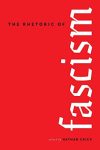
2022
The Rhetoric of Fascism
Ph.D. candidate Ismael Quiñones has an article in Philosophy & Rhetoric and a chapter in the book The Rhetoric of Fascism. The journal article “Colonial Imaginations: Solitude in the Cartas y Relaciones of Hernán Cortés” argues for rhetoric to move beyond the times of nation states and colonization. The chapter “Perfecting Dictatorship: Varga Llosa’s Confrontation with the Mexican PRI” overviews the fascistic strategies used by the PRI throughout the 20th century.
Show More
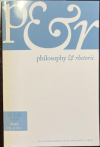
2022
Philosophy & Rhetoric
Ph.D. candidate Ismael Quiñones has an article in Philosophy & Rhetoric and a chapter in the book The Rhetoric of Fascism. The journal article “Colonial Imaginations: Solitude in the Cartas y Relaciones of Hernán Cortés” argues for rhetoric to move beyond the times of nation states and colonization. The chapter “Perfecting Dictatorship: Varga Llosa’s Confrontation with the Mexican PRI” overviews the fascistic strategies used by the PRI throughout the 20th century.
Show More

2022
Mourning in the Anthropocene: Ecological Grief and Earthly Coexistence
Enormous ecological losses and profound planetary transformations mean that ours is a time to grieve beyond the human. Yet, Joshua Trey Barnett argues in this eloquent and urgent book, our capacity to grieve for more-than-human others is neither natural nor inevitable. Weaving together personal narratives, theoretical meditations, and insightful readings of cultural artifacts, he suggests that ecological grief is best understood as a rhetorical achievement. As a collection of worldmaking practices, rhetoric makes things matter, bestows value, directs attention, generates knowledge, and foments feelings. By dwelling on three rhetorical practices—naming, archiving, and making visible—Barnett shows how they prepare us to grieve past, present, and future ecological losses. Simultaneously diagnostic and prescriptive, this book reveals rhetorical practices that set our ecological grief into motion and illuminates pathways to more connected, caring earthly coexistence.
Show More
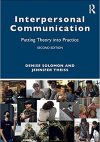
2022
Interpersonal communication: Putting theory into practice
This fully revised text demystifies interpersonal communication skills by bringing the latest research together with practical guidance that prepares students to discern key communication dynamics and communicate more effectively in all areas of their lives.
The new edition draws on current theory and research to guide students through the foundations of the discipline, recent developments in scientific research, and tips for improving their own interpersonal communication skills. In addition, readers will find:
Expanded coverage of technology and computer-mediated communication, including explicit examples of what interpersonal communication looks like online.
Invitations to engage with elaborated descriptions of theories and related resources on the companion website whenever prominent theories of interpersonal communication are mentioned in the text.
A commitment to gender inclusive language and topics, as well as a new feature, “IDEA: Inclusion, Diversity, Equity, and Access,” that invites students to consider ways to address exclusion and inequity in interpersonal communication.
The fully revamped companion website includes updates across all resources, additional videos, self-quizzes for students, and all-new instructor resources, which can be accessed at www.routledge.com/cw/solomon. Also new to the companion website for this edition are links to essays and videos featuring the work that students in the Communication Studies program at the California State Prison, Los Angeles County, produced in response to self-reflection prompts in the first edition. These materials provide insight into facets of interpersonal communication in these students’ lives, and they offer a broad range of rich life experiences.
Show More
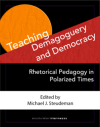
2021
Teaching Demagoguery and Democracy: Rhetorical Pedagogy in Polarized Times
Over the past decade, a global surge of xenophobia, nationalism, and white supremacy has prompted educators to reconsider core assumptions about how they teach. For scholars in the interdisciplinary field of rhetoric, that reconsideration has entailed reckoning with the problem of demagoguery: discourse that privileges in-group identity, evades democratic complexity, and pursues out-group expulsion as a solution to public problems. In this digital collection for Intermezzo, rhetoricians in disciplinary fields of English and communication studies recount this reflective process and their initial efforts to rethink pedagogy for demagogic times.
Show More
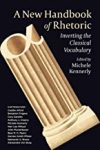
2021
A New Handbook of Rhetoric: Inverting the Classical Vocabulary
Like every discipline, Rhetorical Studies relies on a technical vocabulary to convey specialized concepts, but few disciplines rely so deeply on a set of terms developed so long ago. Pathos, kairos, doxa, topos―these and others originate from the so-called classical world, which has conferred on them excessive authority. Without jettisoning these rhetorical terms altogether, this handbook addresses critiques of their ongoing relevance, explanatory power, and exclusionary effects.
A New Handbook of Rhetoric inverts the terms of classical rhetoric by applying to them the alpha privative, a prefix that expresses absence. Adding the prefix α- to more than a dozen of the most important terms in the field, the contributors to this volume build a new vocabulary for rhetorical inquiry. Essays on apathy, akairos, adoxa, and atopos, among others, explore long-standing disciplinary habits, reveal the denials and privileges inherent in traditional rhetorical inquiry, and theorize new problems and methods. Using this vocabulary in an analysis of current politics, media, and technology, the essays illuminate aspects of contemporary culture that traditional rhetorical theory often overlooks.
Innovative and groundbreaking, A New Handbook of Rhetoric at once draws on and unsettles ancient Greek rhetorical terms, opening new avenues for studying values, norms, and phenomena often stymied by the tradition.
In addition to the editor, the contributors include Caddie Alford, Benjamin Firgens, Cory Geraths, Anthony J. Irizarry, Mari Lee Mifsud, John Muckelbauer, Bess R. H. Myers, Damien Smith Pfister, Nathaniel A. Rivers, and Alessandra Von Burg.
Show More

2021
A New Handbook of Rhetoric: Inverting the Classical Vocabulary
Edited by Michele Kennerly.
Like every discipline, Rhetorical Studies relies on a technical vocabulary to convey specialized concepts, but few disciplines rely so deeply on a set of terms developed so long ago. Pathos, kairos, doxa, topos—these and others originate from the so-called classical world, which has conferred on them excessive authority. Without jettisoning these rhetorical terms altogether, this handbook addresses critiques of their ongoing relevance, explanatory power, and exclusionary effects.
Show More
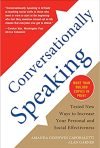
2021
Conversationally speaking: Tested new ways to increase your personal and social effectiveness (3rd)
Conversationally Speaking has become the most popular book in the world teaching conversation skills. Millions of people have used it to learn the secrets of effective communication. This revised edition provides more ways to improve your conversation skills by giving you strategies that work for starting conversations, asking questions that promote interaction, interesting people in what you have to say, listening so that others will be encouraged to talk, avoiding rejection-producing behavior, handling criticism constructively, and more..Everybody thinks that some people are born with the “gift of gab” and some people aren’t. But the truth is there is no “gift of gab.” People who are good at conversation just know a few simple skills that anyone can learn. This book will teach you those skills..Chapter 12 uniquely summarizes in 25 pages the life’s work of famed psychologist Dr. Albert Ellis on overcoming shyness and becoming more confident- and does it so well it received praise from Dr. Ellis himself!.Find out why Toastmaster Magazine calls Conversationally Speaking “the classic how-to book in social communication” and why Dr. Aaron Beck, whose work has had a major influence on thousands of psychologists, calls it “of great value for people who want to sharpen their skills in interpersonal relations.” Click on the “Look Inside” feature above the cover picture and sample the book.
Show More
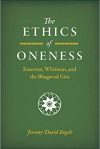
2021
The Ethics of Oneness: Emerson, Whitman, and the Bhagavad Gita
In The Ethics of Oneness, Jeremy David Engels reads the Bhagavad Gita alongside the works of American thinkers Ralph Waldo Emerson and Walt Whitman. Drawing on this rich combination of traditions, Engels presents the notion that individuals are fundamentally interconnected in their shared divinity. In other words, everything is one. If the lessons of oneness are taken to heart, particularly as they were expressed and celebrated by Whitman, and the ethical challenges of oneness considered seriously, Engels thinks it is possible to counter the pervasive and problematic American ideals of hierarchy, exclusion, violence, and domination.
Show More
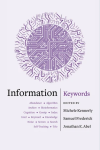
2021
Information Keywords
For decades, we have been told we live in the “information age”—a time when disruptive technological advancement has reshaped the categories and social uses of knowledge and when quantitative assessment is increasingly privileged. Such methodologies and concepts of information are usually considered the provenance of the natural and social sciences, which present them as politically and philosophically neutral. Yet the humanities should and do play an important role in interpreting and critiquing the historical, cultural, and conceptual nature of information.
This book is one of two companion volumes that explore theories and histories of information from a humanistic perspective. They consider information as a long-standing feature of social, cultural, and conceptual management, a matter of social practice, and a fundamental challenge for the humanities today.
Bringing together essays by prominent critics, Information: Keywords highlights the humanistic nature of information practices and concepts by thinking through key terms. It describes and anticipates directions for how the humanities can contribute to our understanding of information from a range of theoretical, historical, and global perspectives. Together with Information: A Reader, it sets forth a major humanistic vision of the concept of information.
Show More
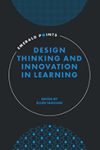
2021
Design Thinking and Innovation in Learning
Acknowledging that empowering today’s learner to find innovative and enriching experiences brings about a deeper desire within them to learn and develop skills, this book showcases a combination of innovative educational practices and creative pedagogy techniques to demonstrate how educators can kick-start learning success.
Show More
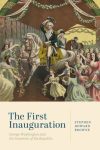
2020
The First Inauguration: George Washington and the Invention of the Republic
In this book, distinguished scholar of early America Stephen Howard Browne chronicles the efforts of the first president of the United States of America to unite the nation through ceremony, celebrations, and oratory. The story follows Washington on his journey from Mount Vernon to the site of the inauguration in Manhattan, recounting the festivities—speeches, parades, dances, music, food, and flag-waving—that greeted the president-elect along the way. Considering the persuasive power of this procession, Browne captures in detail the pageantry, anxiety, and spirit of the nation to arrive at a more nuanced and richly textured perspective on what it took to launch the modern republican state.
Show More
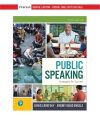
2020
Public Speaking: Strategies for Success, Ninth Edition
Revel™ Public Speaking: Strategies for Success helps readers become strategic public speakers who understand the circumstances in which they speak, make deliberate choices about how to navigate these circumstances, and effectively plan in order to achieve their speaking goals. Emphasizing that public speaking is an art dictated by the dynamics of an audience, authors David Zarefsky and Jeremy Engels highlight the key elements in a successful strategic approach: critical thinking and strategic planning. Along with the fresh perspectives brought by new co-author Jeremy Engels, the 9th Edition offers updated coverage of key areas — diversity, ethics, social media, and more — to address the needs of today’s beginning speakers.
Show More
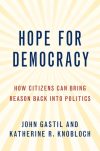
2019
Hope for Democracy: How Citizens Can Bring Reason Back into Politics
Concerned citizens across the globe fear that democratic institutions are failing them. Citizens feel shut out of politics and worry that politicians are no longer responsive to their interests. In Hope for Democracy, John Gastil and Katherine R. Knobloch introduce new tools for tamping down hyper-partisanship and placing citizens at the heart of the democratic process. They showcase the Citizens’ Initiative Review, which convenes a demographically-balanced random sample of citizens to study statewide ballot measures. Citizen panelists interrogate advocates, opponents, and experts, then write an analysis that distills their findings for voters. Gastil and Knobloch reveal how this process has helped voters better understand the policy issues placed on their ballots. Placed in the larger context of deliberative democratic reforms, Hope for Democracy shows how citizens and public officials can work together to bring more rationality and empathy into modern politics.
Show More
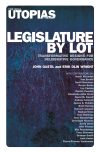
2019
Legislature for Lot: Transformative Designs for Deliberative Governance
The gap between the public and its representatives might seem unbridgeable in the modern world, but Legislature by Lot examines an inspiring solution: a legislature chosen through “sortition”—the random selection of lay citizens. It’s a concept that has come to the attention of democratic reformers across the globe. Proposals for such bodies are being debated in Australia, Belgium, Iceland, the United Kingdom, and many other countries. Sortition promises to reduce corruption and create a truly representative legislature in one fell swoop. In Legislature by Lot, John Gastil and Erik Olin Wright make the case for pairing a sortition body with an elected chamber within a bicameral legislature. Gastil is a leading deliberative democracy scholar, and Wright a distinguished sociologist and editor of the Real Utopias series, of which this is a part. In this volume, they bring together critics and advocates of sortition who have studied ancient Athens, deliberative polling, political theory, social movements, and civic innovation. Without obscuring its limitations, the contributors offer a wide variety of ideas for how to implement sortition and examine its potential for reshaping modern politics.
Show More
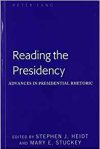
2019
Reading the Presidency: Advances in Presidential Rhetoric
This edited collection explores ways to better understand the rhetorical workings of political executives, especially the United States president. Scholars of the presidency, rhetorical theorists and critics, and various authors examine the ways in which presidents use the institution, the media, and popular culture to instantiate, expand, and wield executive power.
Show More

2018
Oxford Handbook of Advice
Represents, critiques, and advances current theory relevant to understanding advice. Provides a thorough review of major research findings across research paradigms and contexts, showing how those findings form a cohesive, useful body of knowledge. Stimulates future scholarship on advice by explaining, critiquing, and suggesting improvements to methods currently employed, and by identifying valuable research trajectories. Articulates evidence-based “best practices” for advising, providing practical guidance for successful advice interactions within and across contexts
Show More

2018
The Art of Gratitude
Explores how the emotional experience of gratitude has been enlisted in neoliberal governance through the language of debt. In The Art of Gratitude, Jeremy David Engels sketches a genealogy of gratitude from the ancient Greeks to the contemporary self-help movement. One of the most striking things about gratitude, Engels finds, is how consistently it is described using the language of indebtedness. A chief purpose of this, he contends, is to make us more comfortable living lives in debt, with the nefarious effect of pacifying the citizenry so we are less likely to speak out about social and economic injustice. To counteract this, he proposes an alternative art of gratitude-as-thanksgiving that is inspired by Indian philosophy, particularly the yoga philosophy of the Bhagavad Gita and Patanjali’s Yoga-Sutras. He argues that this art of gratitude can challenge neoliberalism by reorienting our politics away from resentment, anger, and guilt and toward a democratic ethic of thanksgiving and the common good.
Show More
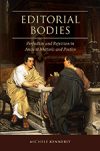
2018
Editorial Bodies
A brief introduction/summary of the book: Editorial Bodies spans three cultural centers—Athens, Alexandria, and Rome—and six centuries to argue against the traditional view in rhetorical studies that associates deterioration in the political constitution of a region with its oratory and poetry surrendering their urgent and public qualities and becoming textual and literary. The book presents a case for the emergence and continuance of a body-based lexicon of compositional care that points to contestation over what kinds of words are worth putting out and keeping out in public in textual form. Furthermore, the book points to the social dynamics of prose and verse writing, which tend to be obscured by the reputations of genius conferred on the ancient writers who are featured.
Show More

2018
Towers of Rhetoric: Memory and Reinvention
Towers of Rhetoric: Memory and Reinvention drives back and forth between the Keystone and Lone Star states essaying to recollect a palimpsest self and to help reinvent rhetorical education. Intended to be read linearly or in some other order, the project is framed by two catastrophic events in U.S. public higher education nearly half a century apart: the 1966 University of Texas Tower shootings and the Penn State child sexual abuse scandal. Pairing the two institutional catastrophes illuminates changes in public higher education and culture over fifty years. In their own ways, the UT Tower shootings and the Penn State child sexual abuse scandal had affective consequences for specific publics within and beyond higher education similar to the cataclysms suffered by many people living in the United States on September 11, 2001. Towers of Rhetoric contributes to memory studies by using rhetoric to forge continuities among the pasts, presents, and futures of these fulcrum events in the context of what Jenny Edkins has called “trauma time.” The special problem of public memory in higher education is an additional fundamental concern. Containing transmedia archival materials as well as recent writing and audio, Towers of Rhetoric takes gravely seriously the individual and social rhetorical acts of writing and speaking, listening and reading, learning and teaching. It sets out — through linear and circular movement, in public and academic writing from the 1980s to 2017 — to aid recollection, private and public.
Show More

2017
Commonplace Witnessing
Commonplace Witnessing examines how citizens, politicians, and civic institutions have adopted idioms of witnessing in recent decades to serve a variety of social, political, and moral ends. The book encourages us to continue expanding and diversifying our normative assumptions about which historical subjects bear witness and how they do so. Commonplace Witnessing presupposes that witnessing in modern public culture is a broad and inclusive rhetorical act; that many different types of historical subjects now think and speak of themselves as witnesses; and that the rhetoric of witnessing can be mundane, formulaic, or popular instead of rare and refined. This study builds upon previous literary, philosophical, psychoanalytic, and theological studies of its subject matter in order to analyze witnessing, instead, as a commonplace form of communication and as a prevalent mode of influence regarding the putative realities and lessons of historical injustice or tragedy. It thus weighs both the uses and disadvantages of witnessing as an ordinary feature of modern public life.
Show More
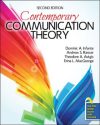
2017
Contemporary Communication Theory
Striking a balance in coverage between the extremes of analyzing too many or too few theories, Contemporary Communication Theory examines important theory building activity in the field of communication. The text continues the tradition of being primarily social science based yet includes research and theories from other theoretical paradigms.
Show More
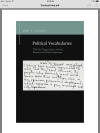
2017
Political Vocabularies: FDR, the Clergy Letters, and the Elements of Political Argument
TBD
Show More
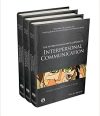
2016
International Encyclopedia of Interpersonal Communication
The International Encyclopedia of Interpersonal Communication presents a comprehensive overview of the theories, concepts and processes that interpersonal communication researchers use to explain a wide variety of social interaction phenomena.
Show More
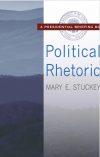
2015
Rhetoric: A Presidential Briefing Book
Rhetoric is among the most important and least understood elements of presidential leadership. Presidents have always wielded rhetoric as one tool of governance―and that rhetoric was always intended to facilitate political ends, such as image building, persuasion of the mass public, and inter-branch government persuasion. But as mass media has grown and then fragmented, as the federal bureaucracy has continued to both expand and calcify, and as partisanship has heightened tensions both within Congress and between Congress and the Executive, rhetoric is an increasingly important element of presidential governance.
Show More
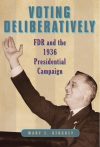
2015
Voting Deliberatively: FDR and the 1936 Presidential Campaign
The 1932 election of Franklin Delano Roosevelt seemed to hold the promise of Democratic domination for years to come. However, leading up to the 1936 election, persistent economic problems, a controversial domestic agenda, and the perception of a weak foreign policy were chipping away at public support. The president faced unrelenting criticism from both the Left and the Right, and it seemed unlikely that he would cruise to the same clear victory he enjoyed in 1932. But 1936 was yet another landslide win for FDR, which makes it easy to forget just how contested the campaign was. In Voting Deliberatively, Mary Stuckey examines little-discussed components of FDR’s 1936 campaign that aided his victory. She reveals four elements of this reelection campaign that have not received adequate attention: the creation of public opinion, the attention paid to local organizations, the focus on specific kinds of interests, and the public rhetoric that tied it all together. Previous studies of the 1936 presidential election discuss elements such as FDR’s vulnerability before the campaign and the weakness of Republican candidate Alf Landon. But these histories pay little attention to the quantity and quality of information Roosevelt acquired, the importance of organizations such as the Good Neighbor League and the Committee of One, the mobilization of the vote, and the ways in which these organizational strategies fused with Roosevelt’s rhetorical strategies. Stuckey shows how these facets combined in one of the largest victories in Electoral College history and provided a template for future victory.
Show More

2015
The Politics of Resentment: A Genealogy
The Politics of Resentment traces the rise of especially violent rhetoric in American public discourse by investigating key events in American history. Engels analyzes how resentful rhetoric has long been used by public figures in order to achieve political ends. He goes on to show how a more devastating form of resentment started in the 1960s, dividing Americans on issues of structural inequalities and foreign policy. He discusses, for example, the rhetorical and political contexts that have made the mobilization of groups such as Nixon’s “silent majority” and the present Tea Party possible. Now, in an age of recession and sequestration, many Americans believe that they have been given a raw deal and experience feelings of injustice in reaction to events beyond individual control. With The Politics of Resentment, Engels wants to make these feelings of victimhood politically productive by challenging the toxic rhetoric that takes us there, by defusing it, and by enabling citizens to have the kinds of conversations we need to have in order to fight for life, liberty, and equality.
Show More
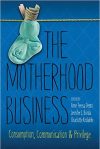
2015
The Motherhood Business: Consumption, Communication, and Privilege
The Motherhood Business explores the consumer life of mothers and the emerging entrepreneurship associated with motherhood. The edited volume examines how different forms of privilege (class, race, and nationality) inform discourses about mothering, consumption, mobility, and leisure.
Show More

2015
Rhetoric Across Borders
Rhetoric Across Borders features twenty-one essays and six excerpts from the “In Conversation” panels convened at the sixteenth Biennial Rhetoric Society of America (RSA) Conference.
Show More

2015
Popular Memories: Commemoration, Participatory Culture, and Democratic Citizenship
In the last three decades ordinary Americans launched numerous grassroots commemorations and official historical institutions became more open to popular participation. In this first book-length study of participatory memory practices, Ekaterina V. Haskins critically examines this trend by asking how and with what consequences participatory forms of commemoration have reshaped the rhetoric of democratic citizenship.
Approaching commemorations as both representations of civic identity and politically consequential sites of stranger interaction, Popular Memories investigates four distinct examples of participatory commemoration: the United States Postal Service’s “Celebrate the Century” stamp and education program, the September 11 Digital Archive, the first post-Katrina Carnival in New Orleans, and a traveling memorial to the human cost of the Iraq War.
Show More
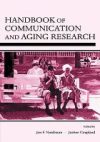
2014
The Handbook of Communication and Aging Research
This second edition of the Handbook of Communication and Aging Research captures the ever-changing and expanding domain of aging research. Since it was first recognized that there is more to social aging than demography, gerontology has needed a communication perspective. Like the first edition, this handbook sets out to demonstrate that aging is not only an individual process but an interactive one. The study of communication can lead to an understanding of what it means to grow old. We may age physiologically and chronologically, but our social aging–how we behave as social actors toward others, and even how we align ourselves with or come to understand the signs of difference or change as we age–are phenomena achieved primarily through communication experiences.
Show More

2014
Democracy in Small Groups: Participation, decision making, and communication, 2nd edition
The second edition of Democracy in Small Groups helps you choose the democratic method appropriate to the most important groups in your life. Reading this book will help you translate abstract theories into workable principles for democratic decision making. You will learn how to overcome the most common obstacles to effective meetings. You will also see how democratic principles can improve your daily life, as well as your larger political institutions. Whether organizing a yard sale for the PTA, a political campaign, or a project team at work, this book can help you and your group make and implement better decisions while building member morale and leadership skills.
Show More

2013
The Good Neighbor: Franklin D. Roosevelt and the Rhetoric of American Power
No modern president has had as much influence on American national politics as Franklin D. Roosevelt. During FDR’s administration, power shifted from states and localities to the federal government; within the federal government it shifted from Congress to the president; and internationally, it moved from Europe to the United States. All of these changes required significant effort on the part of the president, who triumphed over fierce opposition and succeeded in remaking the American political system in ways that continue to shape our politics today. Using the metaphor of the good neighbor, Mary E. Stuckey examines the persuasive work that took place to authorize these changes. Through the metaphor, FDR’s administration can be better understood: his emphasis on communal values; the importance of national mobilization in domestic as well as foreign affairs in defense of those values; his use of what he considered a particularly democratic approach to public communication; his treatment of friends and his delineation of enemies; and finally, the ways in which he used this rhetoric to broaden his neighborhood from the limits of the United States to encompass the entire world, laying the groundwork for American ideological dominance in the post–World War II era.
Show More
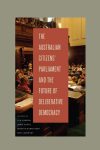
2013
The Australian Citizens Parliament and the Future of Deliberative Democracy
Growing numbers of scholars, practitioners, politicians, and citizens recognize the value of deliberative civic engagement processes that enable citizens and governments to come together in public spaces and engage in constructive dialogue, informed discussion, and decisive deliberation. This book seeks to fill a gap in empirical studies in deliberative democracy by studying the assembly of the Australian Citizens’ Parliament (ACP), which took place in Canberra on February 6–8, 2009. The ACP addressed the question “How can the Australian political system be strengthened to serve us better?” The ACP’s Canberra assembly is the first large-scale, face-to-face deliberative project to be completely audio-recorded and transcribed, enabling an unprecedented level of qualitative and quantitative assessment of participants’ actual spoken discourse. Each chapter reports on different research questions for different purposes to benefit different audiences. Combined, they exhibit how diverse modes of research focused on a single event can enhance both theoretical and practical knowledge about deliberative democracy.
Show More
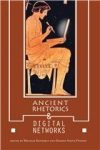
2013
Ancient Rhetorics and Digital Networks
A brief introduction/summary of the book: Ancient Rhetorics and Digital Networks reexamines key figures, texts, concepts, and sensibilities from ancient rhetoric in light of the glow of digital networks, or, ordered conversely, surveys the angles and tangles of digital networks from viewpoints afforded by ancient rhetoric. By providing an orientation grounded in ancient rhetorics, this collection simultaneously historicizes contemporary developments and reenergizes ancient rhetorical vocabularies.
Show More
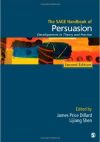
2013
The Sage Handbook of Persuasion: Developments in Theory and Practice
The 2nd edition of the persuasion handbook provides readers with logical, comprehensive summaries of research in a wide range of areas related to persuasion. From a topic standpoint, this handbook takes an interdisciplinary approach, covering issues that will be of interest to interpersonal and mass communication researchers as well as to psychologists and public health practitioners. Persuasion is presented in this volume on a micro to macro continuum, moving from chapters on cognitive processes, the individual, and theories of persuasion, to chapters highlighting broader social factors and phenomena related to persuasion, such as social context and larger scale persuasive campaigns. Each chapter identifies key challenges to the area and provides research strategies for addressing those challenges.
Show More

2013
Rhetoric, Remembrance, and Visual Form: Sighting Memory (2013)
Rhetoric, Remembrance, and Visual Form explores the intersections among visual and memorial forms in modern art, politics, and society through the interdisciplinary lens of rhetoric and communication, art and art history, architecture, and landscape studies. The international collection engages not only how memories may be seen (or sighted) in visual form but also how visual forms constitute noteworthy material sites of memory. The question of the relationships among images and memory is particularly relevant to contemporary society, at a time when visually-based technologies are increasingly employed in both grand and modest efforts to preserve the past amid rapid social change.
Show More

2013
Interpersonal Communication: Putting Theory into Practice
This text provides an introduction to the field of interpersonal communication, suitable for undergraduate majors in communication studies, as well as non-majors.
Show More
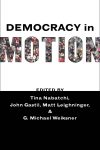
2012
Democracy in Motion: Evaluating the Practice and Impact of Deliberative Civic Engagement
Democracy in Motion represents the first comprehensive attempt to assess the practice and impact of deliberative civic engagement. Organized in a series of chapters that address the big questions of deliberative civic engagement, it uses theory, research, and practice from around the world to explore what we know about, how we know it, and what remains to be understood. More than a simple summary of research, the book is designed to be accessible and useful to a wide variety of audiences, from scholars and practitioners working in numerous disciplines and fields, to public officials, activists, and average citizens who are seeking to utilize deliberative civic engagement in their communities.
Show More
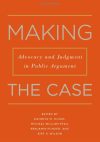
2012
Making the Case: Advocacy and Judgment in Public Argument
In an era when the value of the humanities and qualitative inquiry has been questioned in academia and beyond, Making the Case is an engaging and timely collection that brings together a veritable who’s who of public address scholars to illustrate the power of case-based scholarly argument and to demonstrate how critical inquiry into a specific moment speaks to general contexts and theories. Providing both a theoretical framework and a wealth of historically situated texts, Making the Case spans from Homeric Greece to twenty-first-century America. The authors examine the dynamic interplay of texts and their concomitant rhetorical situations by drawing on a number of case studies, including controversial constitutional arguments put forward by activists and presidents in the nineteenth century, inventive economic pivots by Franklin Roosevelt and Alan Greenspan, and the rhetorical trajectory and method of Barack Obama.
Show More
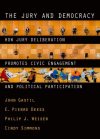
2011
The Jury and Democracy: How Jury Deliberation Promotes Civic Engagement and Political Participation
Drawing from in-depth interviews, thousands of juror surveys, and court and voting records from across the United States, the authors show that serving on a jury can trigger changes in how citizens view themselves, their peers, and their government–and can even significantly increase electoral turnout among infrequent voters. Jury service also sparks long-term shifts in media use, political action, and community involvement. In an era when involved Americans are searching for ways to inspire their fellow citizens, The Jury and Democracy offers a plausible and realistic path for turning passive spectators into active political participants.
Show More

2011
The Routledge Handbook of Health Communication, 2nd Edition
The Routledge Handbook of Health Communication brings together the current body of scholarly work in health communication. With its expansive scope, it offers an introduction for those new to this area, summarizes work for those already learned in the area, and suggests avenues for future research on the relationships between communicative processes and health/health care delivery.
Show More

2010
Enemyship: Democracy and Counter-Revolution in the Early Republic
The Declaration of Independence is usually celebrated as a radical document that inspired revolution in the English colonies, in France, and elsewhere. In Enemyship, however, Jeremy Engels views the Declaration as a rhetorical strategy that outlined wildly effective arguments justifying revolution against a colonial authority— and then threatened political stability once independence was finally achieved. Enemyship examines what happened during the latter years of the Revolutionary War and in the immediate post-Revolutionary period, when the rhetorics and energies of revolution began to seem problematic to many wealthy and powerful Americans. To mitigate this threat, says Engels, the founders of the United States deployed the rhetorics of what he calls “enemyship,” calling upon Americans to unite in opposition to their shared national enemies.
Show More
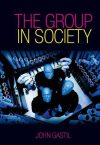
2010
The Group in Society
The Group in Society meets the challenges of teaching courses on small groups by revealing the full complexity of small groups and their place in society. It shows students the value of learning how to carefully study a group’s history and context, rather than merely learning a fixed set of group participation skills. This text brings together disparate theories and research (from communication, social psychology, organizational and managerial studies, and sociology) in a way that helps students make sense of a complex body of scholarship on groups.
Show More

2010
Public Forgetting: The Rhetoric and Politics of Beginning Again
Forgetting is usually juxtaposed with memory as its opposite in a negative way: it is seen as the loss of the ability to remember, or, ironically, as the inevitable process of distortion or dissolution that accompanies attempts to commemorate the past. The civic emphasis on the crucial importance of preserving lessons from the past to prevent us from repeating mistakes that led to violence and injustice, invoked most poignantly in the call of “Never again” from Holocaust survivors, tends to promote a view of forgetting as verging on sin or irresponsibility. In this book, Bradford Vivian hopes to put a much more positive spin on forgetting by elucidating its constitutive role in the formation and transformation of public memory. Using examples ranging from classical rhetoric to contemporary crises like 9/11, Public Forgetting demonstrates how, contrary to conventional wisdom, communities may adopt idioms of forgetting in order to create new and beneficial standards of public judgment concerning the lessons and responsibilities of their shared past.
Show More
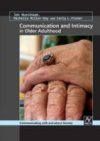
2009
Communication and Intimacy in Older Adulthood
What is intimacy? Intimacy is . . . “warmth, satisfaction, closeness, connection, friendly, touching, caring, spiritual union, emotional union, feeling safe and secure, sharing daily lives, a sense of understanding and a patient attitude, being there for each other, being partners and a team . . . all kinda intertwined.” The study of intimacy as an important ingredient in each of our lives has only recently been the focus of social scientists. Over the past twenty years however, numerous scholars have devoted their careers to documenting the nature and importance of intimate relationships across the entirety of the life span. As the nature of intimacy changes throughout our lives, it becomes important to understand what factors are helping each of us attain intimacy and change the very nature of intimacy as we age. Factors such as gender, cultural norms, interpersonal skills, and physical limitations both enhance and limit our ability to maintain intimacy. Therefore, intimacy may best be understood as a communicative process involving the constant negotiation of the level, type and physical manifestation of that intimacy. Certain communication skills that help us to maintain our close relationships can help us to understand how intimacy can be achieved in later life.
Show More

2009
Brain Health and Optimal Engagement in Older Adulthood
The human brain is a magnificent structure that can function to maximize our ability to lead a very long and satisfying life. Brain health and optimal engagement in older adulthood focuses on the brain as the single most important human organ as we adapt to the many challenges of the aging process. This book links brain health and family, friendship and professional relationships in older adulthood with maintaining a high quality of life well beyond the seventh and eighth decade of life. Pragmatic suggestions based upon the most recent scientific evidence are provided to help each of us maintain brain health. The importance of maintaining a balanced interactive network into older adulthood is not only dependent upon brain health but is shown to be a direct result of brain health. The three authors of this book from three distinct scientific backgrounds: life span development; clinical neuropsychology; and public health, blend their diverse perspectives into a unique understanding of successful aging that offers each reader insight in how to maximize their potential to lead a high quality of life throughout the entirety of the life span.
Show More

2008
The Sage Handbook of Rhetorical Studies
The SAGE Handbook of Rhetorical Studies surveys the latest advances in rhetorical scholarship, synthesizing theories and practices across major areas of study in the field and pointing the way for future studies. Edited by Andrea A. Lunsford and Associate Editors Kirt H. Wilson and Rosa A. Eberly, the Handbook aims to introduce a new generation of students to rhetorical study and provide a deeply informed and ready resource for scholars currently working in the field.
Show More
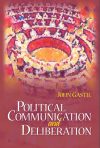
2008
Political Communication and Deliberation
Political Communication and Deliberation takes a unique approach to the field of political communication by viewing key concepts and research through the lens of deliberative democratic theory. This is the first text to argue that communication is central to democratic self-governance primarily because of its potential to facilitate public deliberation. Thus, it offers political communication instructors a new perspective on familiar topics, and it provides those teaching courses on political deliberation with their first central textbook. This text offers students practical theory and experience, teaching them skills and giving them a more direct understanding of the various subtopics in public communication.
Show More
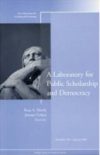
2006
A Laboratory for Public Scholarship and Democracy
This volume of New Directions for Teaching and Learning offers insights into how and why public scholarship has grown and is beginning to sustain itself at Penn State University and beyond. The research and writing contained here was generated by faculty and graduate students active in Penn State’s Laboratory for Public Scholarship and Democracy.
Show More
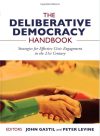
2005
The Deliberative Democracy Handbook: Strategies for Effective Civic Engagement in the Twenty-first Century
The Deliberative Democracy Handbook is a terrific resource for democratic practitioners and theorists alike. It combines rich case material from many cities and types of institutional settings with careful reflection on core principles. It generates hope for a renewed democracy, tempered with critical scholarship and political realism. Most important, this handbook opens a spacious window on the innovativeness of citizens in the U.S. (and around the world) and shows how the varied practices of deliberative democracy are part of a larger civic renewal movement.
Show More

2005
Lifespan Communication
This innovative text emphasizes how communicative processes develop, are maintained, and change throughout the life span. Topics covered include language skills, interpersonal conflict management, socialization, care-giving, and relationship development. Core chapters examine specific communication processes from infancy through childhood and adolescence into middle age and later life.
Show More

2004
Logos and Power in Isocrates and Aristotle
As one of the founding philosophers of the Western tradition, Aristotle raised many of the issues that still animate scholarly debates in the humanities. By contrast Isocrates, despite his considerable reputation in antiquity and the Renaissance as an educator, became a marginal figure in the intellectual history of the West. Logos and Power in Isocrates and Aristotle presents Isocrates’ vision of discourse as a worthy rival, rather than a mere precursor, of Aristotle’s Rhetoric. Casting Isocrates and Aristotle as opponents in a debate over the character, resources, and ends of rhetorical education, Ekaterina V. Haskins argues that much of what Aristotle had to say about the status of rhetoric and the role of discourse in the life of a Greek city-state may have been an implicit reaction to Isocrates. Haskins finds that Isocrates offers a more comprehensive and culturally attuned theory of civic discourse and education than does Aristotle, whose intellectual project disengages moral philosophy from the contingencies of public culture and introduces rhetoric merely as an art serviceable to a philosophically trained statesman. Haskins terms Isocrates’ approach to discourse “constitutive” and Aristotle’s “instrumental” and shows how the former is more congenial to the goals of contemporary rhetorical theory and pedagogy.
Show More

2004
Being Made Strange: Rhetoric beyond Representation
By elaborating upon pivotal twentieth-century studies in language, representation, and subjectivity, Being Made Strange reorients the study of rhetoric according to the discursive formation of subjectivity. The author develops a theory of how rhetorical practices establish social, political, and ethical relations between self and other, individual and collectivity, good and evil, and past and present. He produces a novel methodology that analyzes not only what an individual says, but also the social, political, and ethical conditions that enable him or her to do so. This book also offers valuable ethical and political insights for the study of subjectivity in philosophy, cultural studies, and critical theory.
Show More

2003
Thomas Jefferson’s Call to Nationhood: The First Inaugural Address
Widely celebrated in its own time, Thomas Jefferson’s first inaugural address commands the regard of Americans from across the political spectrum. Delivered as the young nation found itself embroiled in bitter partisan struggles, the speech has been hailed as the Sermon on the Mount of good government.
Show More
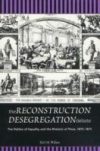
2002
Reconstruction’s Desegregation Debate: The Politics of Equality and the Rhetoric of Place, 1870-1875.
In the decade that followed the Civil War, two questions dominated political debate: To what degree were African Americans now “equal” to white Americans, and how should this equality be implemented in law? Although Republicans entertained multiple, even contradictory, answers to these questions, the party committed itself to several civil rights initiatives. When Congress passed the Thirteenth Amendment, the 1866 Civil Rights Act, the Fourteenth Amendment, and the Fifteenth Amendment, it justified these decisions with a broad egalitarian rhetoric. This rhetoric altered congressional culture, instituting new norms that made equality not merely an ideal, but rather a pragmatic aim for political judgments.
Show More
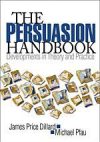
2002
The Persuasion Handbook: Developments in Theory and Practice
The Persuasion Handbook provides readers with cogent, comprehensive summaries of research in a wide range of areas related to persuasion. From a topical standpoint, this handbook takes an interdisciplinary approach, covering issues of interest to interpersonal and mass communication researchers as well as psychologists and public health practitioners. Persuasion is presented in this volume on a micro to macro continuum, moving from chapters on cognitive processes, the individual, and theories of persuasion to chapters highlighting broader social factors and phenomena related to persuasion, such as social context and larger scale persuasive campaigns. Each chapter identifies key challenges to the area and lays out research strategies for addressing those challenges.
Show More
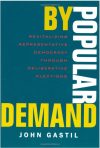
2000
By Popular Demand: Revitalizing Representative Democracy through Deliberative Elections
John Gastil challenges conventional assumptions about public opinion, elections, and political expression in this persuasive treatise on how to revitalize the system of representative democracy in the United States.
Show More

2000
Intergenerational Communication Across the Life Span
Individuals of all ages interact with one another, and their interactions have significance throughout their lives. This distinctive volume acknowledges the importance of these interactions and provides a life-span developmental view of communication and aging, attempting to capture the many similarities and changes that occur in people’s lives as they age. The authors move the study of intergenerational contact closer to the actual participants, examining what happens within intergenerational interactions and how people evaluate their intergenerational experiences. The volume concentrates on the micro-context of the intergenerational interaction and the cognitions, language, and relationship behaviors related to intergenerational communication across the life span. The volume employs the perspective that the understanding of human behavior across the life span is enhanced by studying communicative behavior in intergenerational interaction. The authors integrate research from multiple disciplines concerned with intergenerational communication, which is framed by several unique theoretical perspectives drawn from the communication discipline. As a resource for the study of intergenerational communication across the life span, this monograph offers important insights to scholars, students, and all who are involved in intergenerational communication.
Show More
